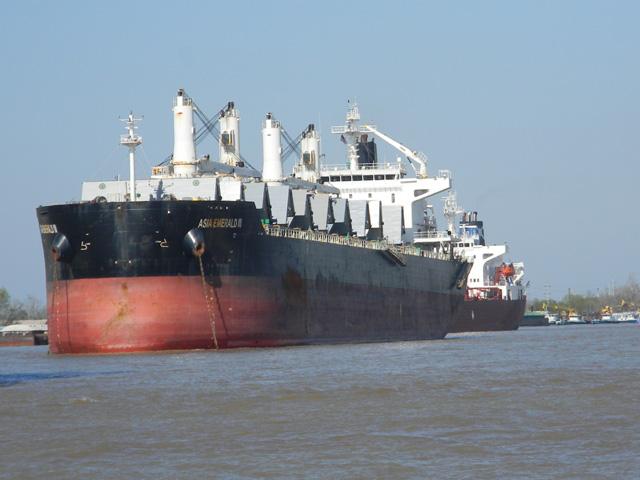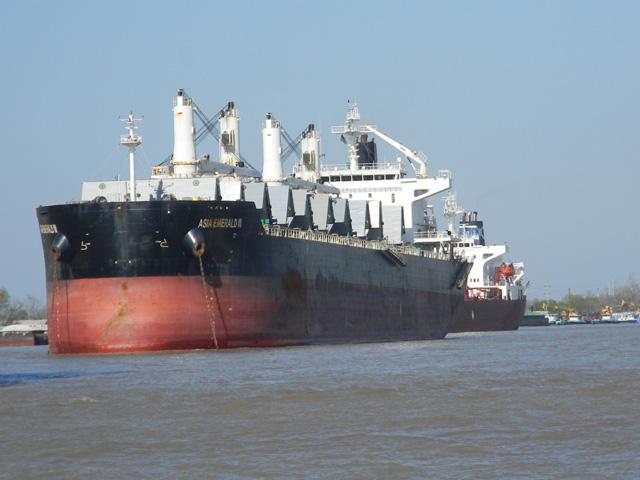Market Matters Blog
Importance of Ocean Shipping Reform Act Highlighted at Transportation Go!
OMAHA (DTN) -- Ocean shipping is important, according to Federal Maritime Commissioner Max Vekich, who spoke recently at the 2023 Transportation Go! conference in Omaha. He highlighted what recent law changes will help the ocean transportation industry.
"The Ocean Shipping Reform Act of 2022 (OSRA) is in place to prevent unfair practices and keep the playing field level," he said. This ranges from fee assessments, to complaints about detention and demurrage charges, to refunds from unreasonable charges.
OSRA was signed into law by President Joe Biden on June 16, 2022. OSRA revises requirements governing ocean shipping to increase the authority of the FMC to promote the growth and development of U.S. exports through an ocean transportation system that is competitive, efficient, and economical.
Vekich noted that OSRA is beneficial to U.S. shippers and "will make ocean carriers more accountable to FMC. Ocean transportation is important; our exports are important."
EVENT DISCUSSES TRANSPORTATION, TRADE ISSUES
Transportation Go! is the premier annual conference for soybean and grain transportation and trade issues in the Midwest.
P[L1] D[0x0] M[300x250] OOP[F] ADUNIT[] T[]
This event, put on by Specialty Soya and Grains Alliance (SSGA), brings in the industry's top stakeholders, from boots on the ground commodity growers and organizations, to traders and shippers of specialty crops. The conference provides in-depth discussions on the global supply chain and how it affects the vital movement of agricultural products domestically and around the world, notes SSGA.
One of the transportation issues on the agenda was ocean shipping and how the FMC is now able to protect the interests of U.S. businesses that rely on ocean transportation to move their goods.
When OSRA was signed in summer, the White House stated in a press release that the Act "authorizes appropriations for the Federal Maritime Commission (FMC) for fiscal years 2022 through 2025; establishes additional requirements and prohibited conduct for ocean carriers; requires the FMC to issue rules related to certain fee assessments, prohibited practices, and establishment of a shipping registry; and authorizes the FMC under certain circumstances to issue an emergency order requiring common carriers to share information directly with shippers and rail and motor carriers."
The Act, among other things, "... requires the FMC to (1) Investigate complaints about detention and demurrage charges (i.e., late fees) charged by common ocean carriers; (2) Determine whether those charges are reasonable; and (3) Order refunds for unreasonable charges. It also prohibits common ocean carriers, marine terminal operators, or ocean transportation intermediaries from unreasonably refusing cargo space when available or resorting to other unfair or unjustly discriminatory methods." To see entire document, go to: https://www.congress.gov/…
WEST COAST LABOR CONTRACT
There remains another concern about moving agricultural and other goods in and out of the U.S.
The "elephant in the room" during the two-day conference was the issue that still remains in limbo -- the West Coast labor contract -- or lack thereof. Long before the labor contract expired on July 1, labor negotiations were ongoing between the International Longshore and Warehouse Union (ILWU), which represents more than 22,000 West Coast port workers, and the Pacific Maritime Association (PMA), which represents port terminals and ocean carriers.
If labor negotiations between the ILWU and the PMA are unsuccessful, disruptions in West Coast port operations may take place. This could divert shipments to other U.S. ports (that has already started), resulting in significant backups at those ports and longer container dwell times. Cargo owners are frustrated about the lack of progress and are concerned that if negotiations fail, there could be a permanent loss of business for West Coast ports. Should a strike take place, of course that would create havoc at all U.S. ports.
Current talks between the ILWU and PMA have been secret, but there is speculation the main sticking point is that ports continue to push for more automation, and the union is concerned that automation will eliminate jobs.
There are indications that the Biden administration is preparing to intervene, as it did last year in the rail contract negotiations. Labor secretary Marty Walsh is reported to be looking to oversee the talks, according to a recent news article by gCaptain Maritime News.
The last time a president stepped in on West Coast labor negotiations was in February 2015 when President Barrack Obama intervened in the nine-month labor dispute that created a slowdown of shipments in the West Coast ports and hundreds of millions of dollars lost.
Mary Kennedy can be reached at Mary.Kennedy@dtn.com
Follow her on Twitter @MaryCKenn
(c) Copyright 2023 DTN, LLC. All rights reserved.






Comments
To comment, please Log In or Join our Community .